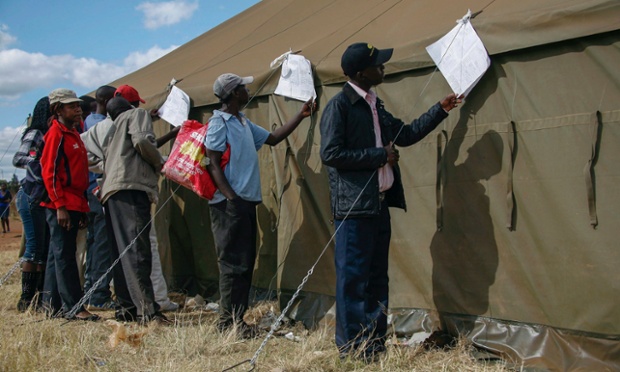
Zimbabwe has held a series of disputed elections since 2000 triggering a national crisis at some historical juncture.
At the centre of the electoral disputes have been the professionalism, impartiality and competence of the Zimbabwe Electoral Commission (Zec).
Ideally, for elections to be considered democratic, Election Management Bodies (EMBs) must be seen to autonomously uphold and enforce rules and procedures fairly.
Across the Zambezi River, the Electoral Commission of Zambia (ECZ) has been hailed for holding free, fair and credible elections with a Constitution that is arguably not as democratic as Zimbabwe’s new Constitution.
In the latest Presidential by-Election held on the 20th of January 2015, most reports issued by independent observers applauded the ECZ for having largely organised an orderly election process while noting some minor challenges for further improvement.
Recommendations to Zec on how to improve the democratic practices Zec must use its needs assessment report, academic and civil society organisation (CSO) reports as a baseline for an independent in-depth expert driven audit of its current secretariat in the next six months in order to strengthen the competency and impartiality of the EMB.
Based on the results of a professional audit, Zec should proceed to retain or employ a new secretariat (such powers are provided in Section 234 of the Zimbabwe Constitution) that is competent and knowledgeable about election management and upholds the principles of public administration for a high standard of impartial and professional performance.
This will go a long way in improving the impartiality of the body as the secretariat in Zambia was largely professional and impartial in the execution of its duties.
- Chamisa under fire over US$120K donation
- Mavhunga puts DeMbare into Chibuku quarterfinals
- Pension funds bet on Cabora Bassa oilfields
- Councils defy govt fire tender directive
Keep Reading
Zec must develop an annual compliance monitoring and evaluation system for its Commissioners during their six-year service term so that they keep subordinated to Section 236 of the Zimbabwe Constitution which emphasise that they must not act in a partisan manner, further the interests of any political party or cause, prejudice the lawful interests of a party or violate the fundamental rights or freedoms of any person and that they must not be members of any political party.
This will ensure continuous compliance with the Constitution and a fair basis for a possible execution of Section 237 which outlines the removal from office of Commissioners.
Creating truly independent commissioners who meet and uphold the constitutional requirements in section 235-237 of the Zimbabwe constitution will go a long way in improving election management.
Zec must continually monitor the performance of its leadership and produce annual public reports.
The monitoring must also be based on continuous display of good public leadership in line with Section 196 (1a-2d) of the Constitution.
These include objectivity and impartiality in decision making; honesty in the execution of public duties; accountability to the public for decisions and actions; and discipline and commitment in the service of the people.
Zec should engage the Zimbabwe government to invest more in mobilising resources for elections and in particular for the Treasury to set aside a specific quota for election management every annual budget starting with the 2016 budget rather than wait for the five year electoral cycle.
This will allow long term tracking of any possible financial resource gap.
In addition, Zec must also engage the government on the need to open up to international funding meant to improve the democraticness of the electoral management body as separate to intervention in internal politics.
The model used to fund The Parliamentary Select Committee (Copac) by agencies like the United Nations Development Programme can be a starting point.
Zec must immediately demand, fully take over and exercise its functions as prescribed in the Constitution that is practice its role to register voters, compile voters’ roll and maintain custody over the voters roll.
Consequently a Voter Registration Model must now be finalised with all key stakeholders involved at every stage.
Our specific view is that Zec must adopt a medium technology assisted/driven voter registration model resulting in a biometric voters’ roll.
In the process procurement of election materials and equipment must be above board.
Zec must appoint a team of professionals with expertise on the use of technology in voting, counting and transmission of results to conduct a study and submit a public report to all the key stakeholders on which type of technology works best for the Zimbabwe context.
Even though technology is not entirely immune to manipulation it can enhance transparency in managing election information if suited to local political conditions.
Zec must promote the need for accreditation of both monitors and observers in line with its constitutional function which is to promote accountability and transparency in public institutions.
Allowing scrutiny enhances transparency and confidence in the processes among stakeholders.
It will also strengthen institutional systems and allow the democratic watchdog role by civil society.
Zec must continuously engage all stakeholders like political parties, civil society organisations, think tanks, observers and other state institutions supporting democracy such as the Zimbabwe Human Rights Commission.
There must be national consensus/convergence to enhance legitimacy and avoid opposition from stakeholders.
A step further is to build strategic partnerships along the electoral cycle such as carrying out PVT with election based CSO partners.
l This is an abridged version of part two of the Election Resource Centre and Crisis in Zimbabwe Coalition Policy Brief on the recent Zambian Presidential By-Election











